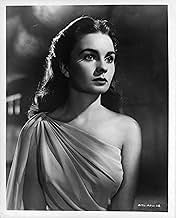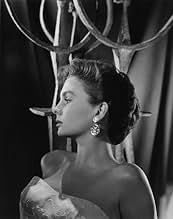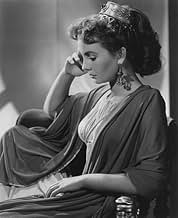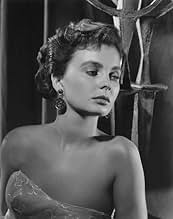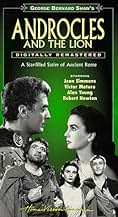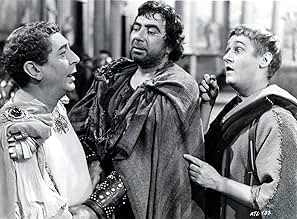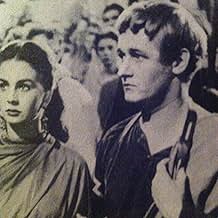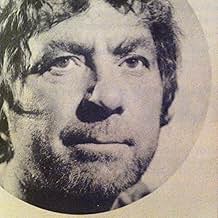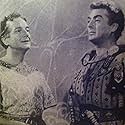IMDb-BEWERTUNG
6,0/10
1146
IHRE BEWERTUNG
Füge eine Handlung in deiner Sprache hinzuStory of a Christian in ancient Rome who befriends a lion.Story of a Christian in ancient Rome who befriends a lion.Story of a Christian in ancient Rome who befriends a lion.
- Regie
- Drehbuch
- Hauptbesetzung
Abdullah Abbas
- Gladiator
- (Nicht genannt)
Doris Barton
- Vestal Virgin
- (Nicht genannt)
Mary Bayless
- Christian
- (Nicht genannt)
Chet Brandenburg
- Christian
- (Nicht genannt)
Carol Brooks
- Vestal Virgin
- (Nicht genannt)
Empfohlene Bewertungen
"Androcles and the Lion" is a film adaptation of a 1912 play by George Bernard Shaw. The Irish playwright and author wrote in various mediums with humor and often biting social commentary. He was an avowed socialist and atheist. But, during much of his later life he expounded on a belief in an advanced state of society and being. He thought of it coming about by evolution.
This film and play is a whimsical version of a tale about an early Christian tailor who is taken prisoner and sent to Rome to be tortured and killed in the coliseum. Most people know the tale, so it doesn't come as a surprise. The humorous jabs at religion, history and government enliven the original tale. One might imagine that the play went over well with audiences in the early 20th century, yet Shaw's laborious prologues or narrations afterwards wore out audiences with his vaunting of socialism and lambasting of everything else. Much of Shaw's intent was to parody the early Christian persecution with the treatment by the British government of the common folk of his day. He says so directly in his Afterword to the play. That was Shaw's vehicle to get on his soapbox for socialism.
But, by the mid-20th century, the allure of socialism was fast fading. And, with the memories of war with heathen enemies still fresh, the spoofing of Christianity had lost its appeal. The film flopped at the box office. Many decades later, just some of the script retains its humor, and the film seems slow and quite dated.
The spoofery of early Christianity in the pagan Roman Empire is apparent at the start. As the captives are being marched off to Rome, they sing "Onward Christian Soldiers." The popular English hymn was written and composed in the late 19th century. The early 20th century audiences of Shaw's play would have known that.
The film has a cast of prominent Hollywood and English actors of the time. A couple of other reviewers give some history about the film delays and cast changes after shooting began. So, Rex Harrison, Dana Andrews, George Sanders and Harpo Marx aren't in the film. Victor Mature is a Roman captain in charge of the Christian prisoners. He is attracted to one of the very joyful (and beautiful) Christians, Lavinia, played by Jean Simmons. Can anyone possibly guess how that might turn out?
Elsa Lanchester, Reginald Gardiner, Gene Lockhart, Alan Mowbray, Jim Backus and Strother Martin are some more of the well-known actors of the day. But the person who steals the show and every scene he is in is Robert Newton as Ferrovius. His role and performance are the bulk of the humor in this film. It's solely for his performance that I give this film six stars. His humor of restraint is very funny, while his lines also convey an accurate quality of the early martyrs that people have admired over the centuries. One wonders if Shaw realized that he was as much honoring the early martyrs as he was poking fun at their cause.
Here are some favorite lines from the film.
Spintho, "Christianity is very contagious, captain. You never can tell where it will strike next. We want to be certain that it does not strike our valiant soldiers... and their officers."
Spintho, "The enemy within is just as dangerous as the enemy without, captain."
Spintho, "Her name is Lavinia. I envy the lion." Captain, "Which lion?" Spintho, "The one that will eat her."
Lavinia, "If I don't behave, I shall be thrown to the lions. And if I do behave I shall be thrown to the lions, just the same. Is that what you mean?"
Centurion, "Now, remember that you're a Christian. You gotta return good for evil."
Androcles, "Easy, Ferrovius, easy. You broke the last man's jaw." Ferrovius, "Yes, but I saved his soul. What matters a broken jaw?"
Androcles, "Let him go, brother. Our religion forbids you to strike him." Ferrovious, "On the contrary, it commands me to strike him. How could he turn the other cheek if he's not first struck on one cheek?"
Editor of the Gladiators, "Caesar will go down in history as the emperor who eliminated these cranks. Hail Caesar!" Emperor Antoninus (Caesar), "On the contrary. I'm more likely to be remembered as the man who did more to perpetuate them." Editor of Gladiators, "You, Caesar?" Emperor Antoninus, "I dare say I am doing more to spread Christianity than all their preachers, missionaries and Gospel writers put together. I shouldn't be surprised if finally I wind up as one of their heroes." Editor of Gladiators, "Caesar jests of course." Emperor Antoninus, "Caesar does not jest. I wager that for every Christian that dies in the bloody sand, two new ones leave the coliseum." Editor of Gladiators, "Perhaps then, Caesar should change his tactics." Emperor Antoninus, "Impossible. I am a subject of history and I must submit to its inevitable course. It is my destiny to fan the fires of Christianity by offering them martyrdom in the arena."
Androcles, "The coliseum! I never thought I'd live to see it."
Emperor Antoninus, "Metellus, you see now the disadvantages of two much severity. These people have no hope, therefore there's nothing to restrain them from saying whatever they like to. They're almost as important as the gladiators."
Ferrovius, "I will not fight. I will die. Better to stand with the archangels than with the Praetorian Guard." Emperor Antoninus, "I cannot believe that the archangels, whoever they may be, would not prefer to be recruited form the Praetorian Guard."
This film and play is a whimsical version of a tale about an early Christian tailor who is taken prisoner and sent to Rome to be tortured and killed in the coliseum. Most people know the tale, so it doesn't come as a surprise. The humorous jabs at religion, history and government enliven the original tale. One might imagine that the play went over well with audiences in the early 20th century, yet Shaw's laborious prologues or narrations afterwards wore out audiences with his vaunting of socialism and lambasting of everything else. Much of Shaw's intent was to parody the early Christian persecution with the treatment by the British government of the common folk of his day. He says so directly in his Afterword to the play. That was Shaw's vehicle to get on his soapbox for socialism.
But, by the mid-20th century, the allure of socialism was fast fading. And, with the memories of war with heathen enemies still fresh, the spoofing of Christianity had lost its appeal. The film flopped at the box office. Many decades later, just some of the script retains its humor, and the film seems slow and quite dated.
The spoofery of early Christianity in the pagan Roman Empire is apparent at the start. As the captives are being marched off to Rome, they sing "Onward Christian Soldiers." The popular English hymn was written and composed in the late 19th century. The early 20th century audiences of Shaw's play would have known that.
The film has a cast of prominent Hollywood and English actors of the time. A couple of other reviewers give some history about the film delays and cast changes after shooting began. So, Rex Harrison, Dana Andrews, George Sanders and Harpo Marx aren't in the film. Victor Mature is a Roman captain in charge of the Christian prisoners. He is attracted to one of the very joyful (and beautiful) Christians, Lavinia, played by Jean Simmons. Can anyone possibly guess how that might turn out?
Elsa Lanchester, Reginald Gardiner, Gene Lockhart, Alan Mowbray, Jim Backus and Strother Martin are some more of the well-known actors of the day. But the person who steals the show and every scene he is in is Robert Newton as Ferrovius. His role and performance are the bulk of the humor in this film. It's solely for his performance that I give this film six stars. His humor of restraint is very funny, while his lines also convey an accurate quality of the early martyrs that people have admired over the centuries. One wonders if Shaw realized that he was as much honoring the early martyrs as he was poking fun at their cause.
Here are some favorite lines from the film.
Spintho, "Christianity is very contagious, captain. You never can tell where it will strike next. We want to be certain that it does not strike our valiant soldiers... and their officers."
Spintho, "The enemy within is just as dangerous as the enemy without, captain."
Spintho, "Her name is Lavinia. I envy the lion." Captain, "Which lion?" Spintho, "The one that will eat her."
Lavinia, "If I don't behave, I shall be thrown to the lions. And if I do behave I shall be thrown to the lions, just the same. Is that what you mean?"
Centurion, "Now, remember that you're a Christian. You gotta return good for evil."
Androcles, "Easy, Ferrovius, easy. You broke the last man's jaw." Ferrovius, "Yes, but I saved his soul. What matters a broken jaw?"
Androcles, "Let him go, brother. Our religion forbids you to strike him." Ferrovious, "On the contrary, it commands me to strike him. How could he turn the other cheek if he's not first struck on one cheek?"
Editor of the Gladiators, "Caesar will go down in history as the emperor who eliminated these cranks. Hail Caesar!" Emperor Antoninus (Caesar), "On the contrary. I'm more likely to be remembered as the man who did more to perpetuate them." Editor of Gladiators, "You, Caesar?" Emperor Antoninus, "I dare say I am doing more to spread Christianity than all their preachers, missionaries and Gospel writers put together. I shouldn't be surprised if finally I wind up as one of their heroes." Editor of Gladiators, "Caesar jests of course." Emperor Antoninus, "Caesar does not jest. I wager that for every Christian that dies in the bloody sand, two new ones leave the coliseum." Editor of Gladiators, "Perhaps then, Caesar should change his tactics." Emperor Antoninus, "Impossible. I am a subject of history and I must submit to its inevitable course. It is my destiny to fan the fires of Christianity by offering them martyrdom in the arena."
Androcles, "The coliseum! I never thought I'd live to see it."
Emperor Antoninus, "Metellus, you see now the disadvantages of two much severity. These people have no hope, therefore there's nothing to restrain them from saying whatever they like to. They're almost as important as the gladiators."
Ferrovius, "I will not fight. I will die. Better to stand with the archangels than with the Praetorian Guard." Emperor Antoninus, "I cannot believe that the archangels, whoever they may be, would not prefer to be recruited form the Praetorian Guard."
George Bernard Shaw was hesitant about allowing his plays to be turned into movies. He was impressed with motion pictures, and frequently allowed himself to be in short subjects where he could reveal his current social theories. Shaw was probably the first major literary figure to leave several reels of film interviews. But he was aware of the liberties taken with literary properties turned into movies - particularly plays. Shakespeare had not fared too well in the movies up to the 1930s. Most filmed plays seemed cut up - the screenwriters, producers, and directors being concerned with time factors. Shaw did not trust his works in their hands.
Shaw found an above-average producer in Gabriel Pascal. Pascal loved Shaw's works and he went to see him. He admitted that he had little money but showed his devotion to Shaw's ideas. Shaw gave him a contract to produce all his plays. From 1938 to 1950 Pascal only produced three films but they were PYGMALION with Leslie Howard and Wendy Hiller, MAJOR BARBARA with Hiller, Robert Morley, Rex Harrison, and Robert Newton, and CAESAR AND CLEOPATRA with Vivian Leigh, Claude Rains, Steward Granger, and Flora Robson. They all remain memorable movies to this day. Although Shaw did complain of some deletions he was well served by these films.
In 1950 Shaw died, but his contract with Pascal was to last until Pascal died. However, Pascal only produced one last film, ANDROCLES AND THE LION. Produced by RKO it was the shortest of the Pascal movies, most likely due to the production standards and controls of RKO boss Howard Hughes. The casting was quite unique, in that the roles were played by pretty well known actors: Newton again, Alan Mowbray, Reginald Gardiner, Victor Mature, Jean Simmons, and Maurice Evans. Although Mature is stiff he gives a capable performance. Newton (not drunk here, like he was in BLACKBEARD) showed what a fine comic actor he could be. Witness the scene where he almost frightens Gardiner to death while explaining why he has become a changed man since he converted to Christianity. Maurice Evans, best recalled now as "Maurice" the father of Samantha on BEWITCHED, gave one of his three best lead parts (with his villain in KIND LADY and his Sir Arthur Sullivan in THE GREAT GILBERT AND SULLIVAN)as the philosophic Roman Emperor. Simmons lightens the film's love story with Mature. She always gave good performances. The interesting role in the film is the lead: Alan Young.
Young's career was taking off in 1952. He had started appearing on television in his own weekly variety/comedy program. He also was looking forward to other film roles. There would be another lead part in the now forgotten AARON SLICK FROM PUNKIN CREEK shortly afterward, and eventually nice supporting roles in TOM THUMB and (possibly his best performance) THE TIME MACHINE (1960). And then his role as Wilbur Post in MR. ED. Not a tremendous career but it got quite a bit of mileage in it, and it is still recalled fondly. He gives a nice performance as a soft-spoken, meek Androcles, who represents the truest spirit of Christianity of all the characters in the film (most of whom do not fully grasp the simplicity and quiet goodness at the heart of the faith). It does not hold center stage or attention in the movie (in fact it is forgotten while we concentrate on the antics of Newton's "muscular" Christianity or the Simmons/Mature romance or Evans' cat and mouse game with a courtier who happens to be a secret Christian, but also a political opportunist). But when Young turns up again, he does keep our attention in his scenes.
The result is an enjoyable film, but not of the standard of the three preceding ones. It would be the model (now that Shaw was dead, and soon after Pascal) of how the movies would treat Shaw's plays. The great dramatist was lucky that Pascal gave his all on those first three, for (except for the film of the musical version of PYGMALION - MY FAIR LADY) most of the remaining films of Shaw's plays (THE DOCTOR'S DELEMMA, THE DEVIL'S DISCIPLE, THE MILLIONAIRESS, GREAT CATHERINE) showed more of the cutting and rewriting - and usually inferior rewriting - that Shaw dreaded. Of the post-1952 films only THE DEVIL'S DISCIPLE and MY FAIR LADY hold up really well.
But there is one intriguing mystery about this film project. Pascal and Howard Hughes did come up with an odd casting of the lead role that was not seen to it's conclusion to the everlasting loss of motion pictures. Androcles was not originally cast for Alan Young, but for Harpo Marx. There were discussions with Harpo to play the role, and there may have been some actual footage shot for about a month, when Hughes decided it was not going to work out. Harpo was removed from the film, and Young got the role. Leaving a great hole in the story: what was the original film to be - was Harpo to perform his usual way (pantomime) or did he actually essay for the first time in his career to speak the lines. We don't know. While footage of lost movies occasionally turns up (such as Joseph Von Stenberg's I CLAUDIUS), most of these films that are jettisoned are destroyed. One hopes that Harpo's attempted performance was put on some film that has survived. It would be wonderful to see him in a talking role in a serious play by an English literary master. Harpo prided himself on his erudition and self-taught education He was a member of the Algonquin Circle with Kaufman and Hart, Alexander Woolcott, Edna Ferber, and Morris Ryskind. He should have made a fascinating figure as Androcles, but instead he was replaced. I safely feel it was our loss.
Shaw found an above-average producer in Gabriel Pascal. Pascal loved Shaw's works and he went to see him. He admitted that he had little money but showed his devotion to Shaw's ideas. Shaw gave him a contract to produce all his plays. From 1938 to 1950 Pascal only produced three films but they were PYGMALION with Leslie Howard and Wendy Hiller, MAJOR BARBARA with Hiller, Robert Morley, Rex Harrison, and Robert Newton, and CAESAR AND CLEOPATRA with Vivian Leigh, Claude Rains, Steward Granger, and Flora Robson. They all remain memorable movies to this day. Although Shaw did complain of some deletions he was well served by these films.
In 1950 Shaw died, but his contract with Pascal was to last until Pascal died. However, Pascal only produced one last film, ANDROCLES AND THE LION. Produced by RKO it was the shortest of the Pascal movies, most likely due to the production standards and controls of RKO boss Howard Hughes. The casting was quite unique, in that the roles were played by pretty well known actors: Newton again, Alan Mowbray, Reginald Gardiner, Victor Mature, Jean Simmons, and Maurice Evans. Although Mature is stiff he gives a capable performance. Newton (not drunk here, like he was in BLACKBEARD) showed what a fine comic actor he could be. Witness the scene where he almost frightens Gardiner to death while explaining why he has become a changed man since he converted to Christianity. Maurice Evans, best recalled now as "Maurice" the father of Samantha on BEWITCHED, gave one of his three best lead parts (with his villain in KIND LADY and his Sir Arthur Sullivan in THE GREAT GILBERT AND SULLIVAN)as the philosophic Roman Emperor. Simmons lightens the film's love story with Mature. She always gave good performances. The interesting role in the film is the lead: Alan Young.
Young's career was taking off in 1952. He had started appearing on television in his own weekly variety/comedy program. He also was looking forward to other film roles. There would be another lead part in the now forgotten AARON SLICK FROM PUNKIN CREEK shortly afterward, and eventually nice supporting roles in TOM THUMB and (possibly his best performance) THE TIME MACHINE (1960). And then his role as Wilbur Post in MR. ED. Not a tremendous career but it got quite a bit of mileage in it, and it is still recalled fondly. He gives a nice performance as a soft-spoken, meek Androcles, who represents the truest spirit of Christianity of all the characters in the film (most of whom do not fully grasp the simplicity and quiet goodness at the heart of the faith). It does not hold center stage or attention in the movie (in fact it is forgotten while we concentrate on the antics of Newton's "muscular" Christianity or the Simmons/Mature romance or Evans' cat and mouse game with a courtier who happens to be a secret Christian, but also a political opportunist). But when Young turns up again, he does keep our attention in his scenes.
The result is an enjoyable film, but not of the standard of the three preceding ones. It would be the model (now that Shaw was dead, and soon after Pascal) of how the movies would treat Shaw's plays. The great dramatist was lucky that Pascal gave his all on those first three, for (except for the film of the musical version of PYGMALION - MY FAIR LADY) most of the remaining films of Shaw's plays (THE DOCTOR'S DELEMMA, THE DEVIL'S DISCIPLE, THE MILLIONAIRESS, GREAT CATHERINE) showed more of the cutting and rewriting - and usually inferior rewriting - that Shaw dreaded. Of the post-1952 films only THE DEVIL'S DISCIPLE and MY FAIR LADY hold up really well.
But there is one intriguing mystery about this film project. Pascal and Howard Hughes did come up with an odd casting of the lead role that was not seen to it's conclusion to the everlasting loss of motion pictures. Androcles was not originally cast for Alan Young, but for Harpo Marx. There were discussions with Harpo to play the role, and there may have been some actual footage shot for about a month, when Hughes decided it was not going to work out. Harpo was removed from the film, and Young got the role. Leaving a great hole in the story: what was the original film to be - was Harpo to perform his usual way (pantomime) or did he actually essay for the first time in his career to speak the lines. We don't know. While footage of lost movies occasionally turns up (such as Joseph Von Stenberg's I CLAUDIUS), most of these films that are jettisoned are destroyed. One hopes that Harpo's attempted performance was put on some film that has survived. It would be wonderful to see him in a talking role in a serious play by an English literary master. Harpo prided himself on his erudition and self-taught education He was a member of the Algonquin Circle with Kaufman and Hart, Alexander Woolcott, Edna Ferber, and Morris Ryskind. He should have made a fascinating figure as Androcles, but instead he was replaced. I safely feel it was our loss.
This 1952 film was the first film version of a George Bernard Shaw play produced after the playwright's death, and the compromises are already obvious.
Shaw had had artistic control over three films produced from his plays-- the 1938 "Pygmalion", "Major Barbara" (1941) and "Caesar and Cleopatra" (1945), and his influence had clearly been felt, some would say for both good and bad. He had had absolute final say-so over the casting, and, after his experience with "Pygmalion", Shaw became somewhat more demanding and insisted that not a word be cut from both "Major Barbara" and "Caesar and Cleopatra", a decision that resulted in both of these excellent films being flops. "Androcles and the Lion" clocks in at less than two hours.
The casting suffers without Shaw's influence. Because this is an RKO release directed by Chester Erskine, a not especially distinguished American director, the cast features two American actors in major roles, and the clash between their style of acting, and that of the British actors who HAVE had experience with Shaw, is apparent. Some other American actors can be seen in bit roles.
In a blatant effort to court the average movie audience who wouldn't recognize a Shaw play if it hit them in the face, movie hunk Victor Mature (yes, the very same actor who appeared in "The Robe" and "Samson and Delilah") is cast in the somewhat demanding role of a Roman captain trying to understand the Christian martyrs. An actor like James Mason or Stewart Granger might have been perfect and would have had the necessary acting ability, but Mature, although apparently trying hard, comes close to wrecking the film and destroying its Shavian flavor. And he gets second billing!
Alan Young, whom most people will remember as Wilbur from the "Mr.Ed" TV series, is also American, but is a far better actor than Mature, and although his style sometimes seems as if it straight out of a sitcom rather than a Shaw play, Young does quite a good job in the all-important lead role of Androcles. But was it the Hollywood adaptors, or is it REALLY Shaw who gave the lion the endearing name of "Tommy"? Or is that just another sop to the movie-going crowd who loves animals with cute names?
The rest of the cast is just fine--Jean Simmons excellent, and not syrupy, as a devout woman willing to face martyrdom in the arena, Robert Newton, hilarious as a hulking strongman converted to Christianity who can barely be kept from singlehandedly demolishing his enemies, Noel Willman, Elsa Lanchester in the brief role of Androcles' wife, and, in his best screen performance, Maurice Evans (Dr. Zaius in the 1968 "Planet of the Apes") as the Roman emperor. They make this film exactly what it should be.
Shaw had had artistic control over three films produced from his plays-- the 1938 "Pygmalion", "Major Barbara" (1941) and "Caesar and Cleopatra" (1945), and his influence had clearly been felt, some would say for both good and bad. He had had absolute final say-so over the casting, and, after his experience with "Pygmalion", Shaw became somewhat more demanding and insisted that not a word be cut from both "Major Barbara" and "Caesar and Cleopatra", a decision that resulted in both of these excellent films being flops. "Androcles and the Lion" clocks in at less than two hours.
The casting suffers without Shaw's influence. Because this is an RKO release directed by Chester Erskine, a not especially distinguished American director, the cast features two American actors in major roles, and the clash between their style of acting, and that of the British actors who HAVE had experience with Shaw, is apparent. Some other American actors can be seen in bit roles.
In a blatant effort to court the average movie audience who wouldn't recognize a Shaw play if it hit them in the face, movie hunk Victor Mature (yes, the very same actor who appeared in "The Robe" and "Samson and Delilah") is cast in the somewhat demanding role of a Roman captain trying to understand the Christian martyrs. An actor like James Mason or Stewart Granger might have been perfect and would have had the necessary acting ability, but Mature, although apparently trying hard, comes close to wrecking the film and destroying its Shavian flavor. And he gets second billing!
Alan Young, whom most people will remember as Wilbur from the "Mr.Ed" TV series, is also American, but is a far better actor than Mature, and although his style sometimes seems as if it straight out of a sitcom rather than a Shaw play, Young does quite a good job in the all-important lead role of Androcles. But was it the Hollywood adaptors, or is it REALLY Shaw who gave the lion the endearing name of "Tommy"? Or is that just another sop to the movie-going crowd who loves animals with cute names?
The rest of the cast is just fine--Jean Simmons excellent, and not syrupy, as a devout woman willing to face martyrdom in the arena, Robert Newton, hilarious as a hulking strongman converted to Christianity who can barely be kept from singlehandedly demolishing his enemies, Noel Willman, Elsa Lanchester in the brief role of Androcles' wife, and, in his best screen performance, Maurice Evans (Dr. Zaius in the 1968 "Planet of the Apes") as the Roman emperor. They make this film exactly what it should be.
After his gargantuan Technicolor folly 'Caesar and Cleopatra' nearly bankrupted Lord Rank, producer Gabriel Pascal ended his film career with a whimper at RKO with a final, much cheaper Shavian adaptation in black & white.
It's not really any more stagy than the earlier epic, and provides the satisfaction of seeing a radiant Jean Simmons promoted from a bit player in the former film to the female lead. Elsa Lanchester is a scream as the hero's nagging wife, Robert Newton as Ferrovious, described as having "the strength of an elephant and the temper of an angry bull" is fearsome even when turning the other cheek. And it's not every day you see Jim Backus playing a centurion.
It's not really any more stagy than the earlier epic, and provides the satisfaction of seeing a radiant Jean Simmons promoted from a bit player in the former film to the female lead. Elsa Lanchester is a scream as the hero's nagging wife, Robert Newton as Ferrovious, described as having "the strength of an elephant and the temper of an angry bull" is fearsome even when turning the other cheek. And it's not every day you see Jim Backus playing a centurion.
This is the flaming story of history's most fabulous era, a period of regal splendor, beautiful women, pursued Christians and spectacular combats on the circus arena during the glittering days of pagan Rome. Stage-bound Hollywood rendition based on George Bernard Shaw's great play about a taylor : Alan Young, in imperial Rome who saves Christians from a hungry lion who had formerly befriended.
This attractive film packs sharp dialogue, laughs supreme, entertainment and a lot of fun-midst scenes of sensational wonders into the Roman world . Including a sympathetic, intelligent and charming plot within the bounds of Hollywood. The film is pretty well, but it isn't an extraordinary yarn , but a simple and plain amusement, resulting to be a semi-satisfactory morsel. Harpo Marx was originally cas as Androcles but he was fired by the famous financer and producer Howard Hughes five weeks into the filming. Main and support cast are frankly good, such as : Alan Young as the likeable and silly Androcles , Jean Simmons as Christian damsel in distress , Maurice Evans as the proud emperor and Victor Mature as a Centurion, the latter also played other Colossal films as "The Robe" and "Demetrius and the Gladiators" . Along with an awesome support cast, such as : John Hoyt, Alan Mowbray, Elsa Lanchaster, Gene Lockhart, Noel Willman, Lowell Gilmore, Jim Backus, and several others.
It displays an atmospheric cinematography in black and white by cameraman Harry Stradling Sr, though mostly shot in studio . The motion picture was professionally written and directed by Chester Erskine and uncredited Nicolas Ray . Chester Erskine was a good craftsman, a prestigious writer who made a few movies, such as : "Irish whiskey rebellion" , "A change in the wind" , "A girl in every port", "The egg and I" , "Take one false step" , "A change in the wind" , "Frankie and Johnny" , among others. Rating : 6/10. Passable and acceptable. Well worth seeing.
This attractive film packs sharp dialogue, laughs supreme, entertainment and a lot of fun-midst scenes of sensational wonders into the Roman world . Including a sympathetic, intelligent and charming plot within the bounds of Hollywood. The film is pretty well, but it isn't an extraordinary yarn , but a simple and plain amusement, resulting to be a semi-satisfactory morsel. Harpo Marx was originally cas as Androcles but he was fired by the famous financer and producer Howard Hughes five weeks into the filming. Main and support cast are frankly good, such as : Alan Young as the likeable and silly Androcles , Jean Simmons as Christian damsel in distress , Maurice Evans as the proud emperor and Victor Mature as a Centurion, the latter also played other Colossal films as "The Robe" and "Demetrius and the Gladiators" . Along with an awesome support cast, such as : John Hoyt, Alan Mowbray, Elsa Lanchaster, Gene Lockhart, Noel Willman, Lowell Gilmore, Jim Backus, and several others.
It displays an atmospheric cinematography in black and white by cameraman Harry Stradling Sr, though mostly shot in studio . The motion picture was professionally written and directed by Chester Erskine and uncredited Nicolas Ray . Chester Erskine was a good craftsman, a prestigious writer who made a few movies, such as : "Irish whiskey rebellion" , "A change in the wind" , "A girl in every port", "The egg and I" , "Take one false step" , "A change in the wind" , "Frankie and Johnny" , among others. Rating : 6/10. Passable and acceptable. Well worth seeing.
Wusstest du schon
- WissenswertesAfter principal filming was completed, Howard Hughes decided the film needed some extra sprucing up. He had Nicholas Ray shoot a "Vestal Virgin Bathing Sequence" which immediately ran afoul with censors and enraged producer Gabriel Pascal, amongst others. The sequence was eventually deleted from release prints.
- PatzerThe Christians sing "Onward, Christian Soldiers" - a hymn published in 1871.
- Crazy CreditsOpening credits prologue: ROME 161 A.D. IN THE REGION OF THE EMPEROR ANTONINUS
- VerbindungenFeatured in It's Showtime (1976)
- SoundtracksOnward, Christian Soldiers
(uncredited)
Music by Arthur Sullivan
Words by Sabine Baring-Gould
Sung by the marching Christians
Top-Auswahl
Melde dich zum Bewerten an und greife auf die Watchlist für personalisierte Empfehlungen zu.
- How long is Androcles and the Lion?Powered by Alexa
Details
Box Office
- Budget
- 1.250.000 $ (geschätzt)
- Laufzeit1 Stunde 38 Minuten
- Farbe
- Seitenverhältnis
- 1.37 : 1
Zu dieser Seite beitragen
Bearbeitung vorschlagen oder fehlenden Inhalt hinzufügen

Oberste Lücke
By what name was Androkles und der Löwe (1952) officially released in India in English?
Antwort
